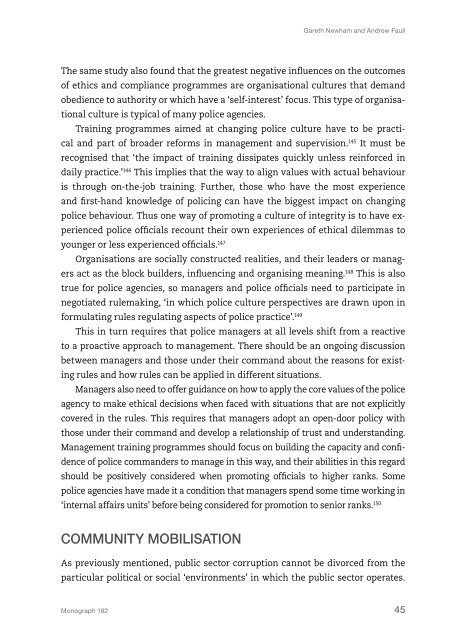Protector or predator? - Institute for Security Studies
Protector or predator? - Institute for Security Studies
Protector or predator? - Institute for Security Studies
Create successful ePaper yourself
Turn your PDF publications into a flip-book with our unique Google optimized e-Paper software.
Gareth Newham and Andrew Faull<br />
The same study also found that the greatest negative influences on the outcomes<br />
of ethics and compliance programmes are <strong>or</strong>ganisational cultures that demand<br />
obedience to auth<strong>or</strong>ity <strong>or</strong> which have a ‘self-interest’ focus. This type of <strong>or</strong>ganisational<br />
culture is typical of many police agencies.<br />
Training programmes aimed at changing police culture have to be practical<br />
and part of broader ref<strong>or</strong>ms in management and supervision. 145 It must be<br />
recognised that ‘the impact of training dissipates quickly unless reinf<strong>or</strong>ced in<br />
daily practice.’ 146 This implies that the way to align values with actual behaviour<br />
is through on-the-job training. Further, those who have the most experience<br />
and first-hand knowledge of policing can have the biggest impact on changing<br />
police behaviour. Thus one way of promoting a culture of integrity is to have experienced<br />
police officials recount their own experiences of ethical dilemmas to<br />
younger <strong>or</strong> less experienced officials. 147<br />
Organisations are socially constructed realities, and their leaders <strong>or</strong> managers<br />
act as the block builders, influencing and <strong>or</strong>ganising meaning. 148 This is also<br />
true f<strong>or</strong> police agencies, so managers and police officials need to participate in<br />
negotiated rulemaking, ‘in which police culture perspectives are drawn upon in<br />
f<strong>or</strong>mulating rules regulating aspects of police practice’. 149<br />
This in turn requires that police managers at all levels shift from a reactive<br />
to a proactive approach to management. There should be an ongoing discussion<br />
between managers and those under their command about the reasons f<strong>or</strong> existing<br />
rules and how rules can be applied in different situations.<br />
Managers also need to offer guidance on how to apply the c<strong>or</strong>e values of the police<br />
agency to make ethical decisions when faced with situations that are not explicitly<br />
covered in the rules. This requires that managers adopt an open-do<strong>or</strong> policy with<br />
those under their command and develop a relationship of trust and understanding.<br />
Management training programmes should focus on building the capacity and confidence<br />
of police commanders to manage in this way, and their abilities in this regard<br />
should be positively considered when promoting officials to higher ranks. Some<br />
police agencies have made it a condition that managers spend some time w<strong>or</strong>king in<br />
‘internal affairs units’ bef<strong>or</strong>e being considered f<strong>or</strong> promotion to seni<strong>or</strong> ranks. 150<br />
CommUNity mobiliSATiON<br />
As previously mentioned, public sect<strong>or</strong> c<strong>or</strong>ruption cannot be div<strong>or</strong>ced from the<br />
particular political <strong>or</strong> social ‘environments’ in which the public sect<strong>or</strong> operates.<br />
Monograph 182 45

















